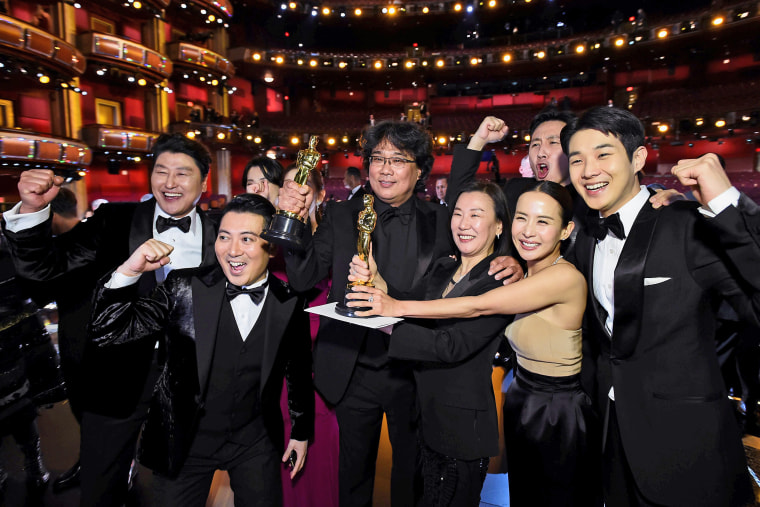LOS ANGELES — "Parasite" made history as the first foreign language film to ever win the Academy Award for best picture, in addition to taking home three other awards for best director, best international feature film and best original screenplay. It earned South Korea its first Oscar nominations and wins ever.
But even with the accolades heaped upon writer/director Bong Joon Ho's elegant, unsettling dark comedy about inequality in the age of modern capitalism, "Parasite" was wholly shut out of any acting nods, continuing the Academy's legacy of largely ignoring Asian actors, both from abroad and in the U.S.
Awkwafina (Nora Lum) was also ignored this year for her dramatic turn in "The Farewell," as was her co-star Zhao Shuzhen. The film itself, written and directed by Lulu Wang, who is Chinese American, didn't earn a single nomination. The exclusion was all the more galling considering that Awkwafina earned a Golden Globe and Zhao picked up an Independent Spirit Award.
In the Oscars' 92-year history, few actors of Asian or South Asian descent have been nominated, and barely a handful have won, among them Ben Kingsley for "Gandhi" in 1982 and Haing S. Ngor for "The Killing Fields" in 1984. The most recent nominee was Dev Patel for best supporting actor for "Lion" in 2017.
More white female actors have won Oscars for playing East Asian characters than female actors of actual East Asian descent: Luise Rainer won for "The Good Earth" in 1938 and, in 1983, Linda Hunt won for playing Billy Kwan, an Asian male dwarf, in "The Year of Living Dangerously."
And despite the box office success of "Crazy Rich Asians" in 2018, actors of Asian descent remain woefully underrepresented on the big screen. According to UCLA's Hollywood Diversity report, Asian actors constituted just 3.4 percent of all film roles as recently as 2017.
In all, the stars of "Parasite" -- Cho Yeo Jeong, Park So Dam, Choi Woo Shik, Song Kang Ho, Chang Hyae Jin, Jung Ziso, Jung Hyeon Jun, Lee Sun Kyun, Lee Jung Eun and Park Myung Hoon -- have nabbed only one notable acting accolade in Hollywood: outstanding performance by a cast in a motion picture at the Screen Actor Guild awards, the first foreign film cast to win.
The Academy's failure to acknowledge any of their individual performances speaks not only to the organization's spotty record of recognizing actors of color, period, but also suggests more insidious stereotypes about people of Asian descent specifically: That we are communal to a fault, interchangeable, nameless and - perhaps most damaging - all look too similar to tell apart.
And the Academy members are not alone: Members of the press routinely and glibly dismissed the South Korean stars as the "'Parasite' cast" rather than by addressing them by their individual names.
But the magic of "Parasite," in addition to the director Bong's meticulous visual metaphors underlining the haves and will-never-haves, is undeniably in the performances -- the smirking condescension of Lee Sun Kyun's Nathan Park towards Song Kang Ho's Ki Taek, the latter whose rage bubbles over with devastating consequences and Ki Jeong's buoyant con artistry, so brilliantly brought to life by Park So Dam.
To ignore the parts that make the film's complicated, haunting whole is to flatten the nuances of their individual contributions, a passive-aggressive type of erasure that reinforces the myopia the Academy has said it so earnestly wants to combat.
Throughout awards season, director Bong has emphasized Hollywood's provincialism, once describing the Oscars to Vulture as a "very local" awards show and famously -- if lightheartedly -- chiding English-speaking audiences for their aversion to reading.
"Once you overcome the one-inch tall barrier of subtitles, you will be introduced to so many more amazing films," said Bong in his acceptance speech for the Golden Globe award for best foreign film.
Hopefully the momentum of "Parasite's" winning night will push the Academy toward overcoming whatever barriers it still has in recognizing the performers who bring that cinematic language to life.
